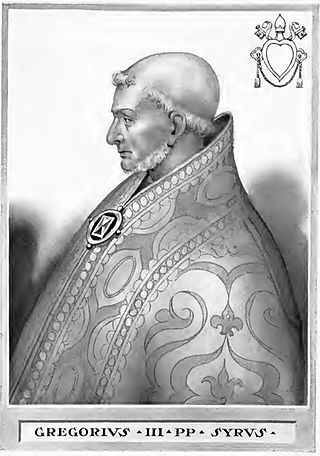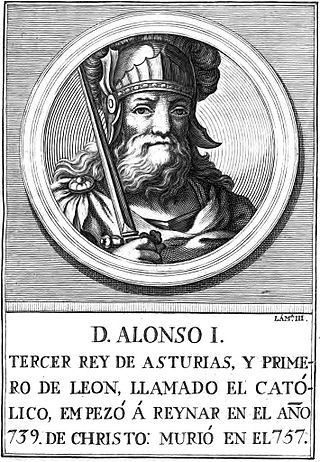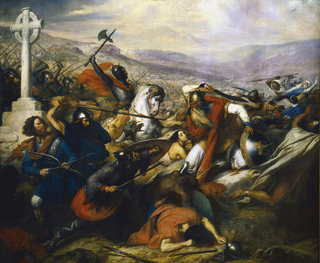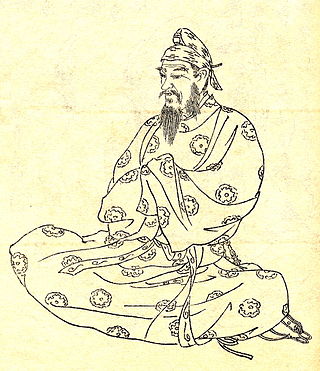
Year 714 (DCCXIV) was a common year starting on Monday of the Julian calendar. The denomination 714 for this year has been used since the early medieval period, when the Anno Domini calendar era became the prevalent method in Europe for naming years.

Year 731 (DCCXXXI) was a common year starting on Monday of the Julian calendar. The denomination 731 for this year has been used since the early medieval period, when the Anno Domini calendar era became the prevalent method in Europe for naming years.
The 730s decade ran from January 1, 730, to December 31, 739.
The 720s decade ran from January 1, 720, to December 31, 729.
The 710s decade ran from January 1, 710, to December 31, 719.

Year 710 (DCCX) was a common year starting on Wednesday of the Julian calendar. The denomination 710 for this year has been used since the early medieval period, when the Anno Domini calendar era became the prevalent method in Europe for naming years.

Year 740 (DCCXL) was a leap year starting on Friday of the Julian calendar, the 740th year of the Common Era (CE) and Anno Domini (AD) designations, the 740th year of the 1st millennium, the 40th year of the 8th century, and the 1st year of the 740s decade. The denomination 740 for this year has been used since the early medieval period, when the Anno Domini calendar era became the prevalent method in Europe for naming years.

Year 732 (DCCXXXII) was a leap year starting on Tuesday of the Julian calendar, the 732nd year of the Common Era (CE) and Anno Domini (AD) designations, the 732nd year of the 1st millennium, the 32nd year of the 8th century, and the 3rd year of the 730s decade. The denomination 732 for this year has been used since the early medieval period, when the Anno Domini calendar era became the prevalent method in Europe for naming years.
Year 722 (DCCXXII) was a common year starting on Thursday of the Julian calendar. The denomination 722 for this year has been used since the early medieval period, when the Anno Domini calendar era became the prevalent method in Europe for naming years.

Year 724 (DCCXXIV) was a leap year starting on Saturday of the Julian calendar, the 724th year of the Common Era (CE) and Anno Domini (AD)

Year 718 (DCCXVIII) was a common year starting on Saturday of the Julian calendar, the 718th year of the Common Era (CE) and Anno Domini (AD) designations, the 718th year of the 1st millennium, the 18th year of the 8th century, and the 9th year of the 710s decade. The denomination 718 for this year has been used since the early medieval period, when the Anno Domini calendar era became the prevalent method in Europe for naming years.

Year 720 (DCCXX) was a leap year starting on Monday of the Julian calendar. The denomination 720 for this year has been used since the early medieval period, when the Anno Domini calendar era became the prevalent method in Europe for naming years.

Year 713 (DCCXIII) was a common year starting on Sunday of the Julian calendar, the 713th year of the Common Era (CE) and Anno Domini (AD) designations, the 713th year of the 1st millennium, the 13th year of the 8th century, and the 4th year of the 710s decade. The denomination 713 for this year has been used since the early medieval period, when the Anno Domini calendar era became the prevalent method in Europe for naming years.

Year 716 (DCCXVI) was a leap year starting on Wednesday of the Julian calendar, the 716th year of the Common Era (CE) and Anno Domini (AD) designations, the 716th year of the 1st millennium, the 16th year of the 8th century, and the 7th year of the 710s decade. The denomination 716 for this year has been used since the early medieval period, when the Anno Domini calendar era became the prevalent method in Europe for naming years.

Year 719 (DCCXIX) was a common year starting on Sunday of the Julian calendar, the 719th year of the Common Era (CE) and Anno Domini (AD) designations, the 719th year of the 1st millennium, the 19th year of the 8th century, and the 10th and last year of the 710s decade. The denomination 719 for this year has been used since the early medieval period, when the Anno Domini calendar era became the prevalent method in Europe for naming years.

Year 721 (DCCXXI) was a common year starting on Wednesday of the Julian calendar. The denomination 721 for this year has been used since the early medieval period, when the Anno Domini calendar era became the prevalent method in Europe for naming years.
Year 725 (DCCXXV) was a common year starting on Monday of the Julian calendar. The denomination 725 for this year has been used since the early medieval period, when the Anno Domini calendar era became the prevalent method in Europe for naming years.
Year 729 (DCCXXIX) was a common year starting on Saturday of the Julian calendar, the 729th year of the Common Era (CE) and Anno Domini (AD) designations, the 729th year of the 1st millennium, the 29th year of the 8th century, and the 10th and last year of the 720s decade. The denomination 729 for this year has been used since the early medieval period, when the Anno Domini calendar era became the prevalent method in Europe for naming years.

Year 738 (DCCXXXVIII) was a common year starting on Wednesday of the Julian calendar, the 738th year of the Common Era (CE) and Anno Domini (AD) designations, the 738th year of the 1st millennium, the 38th year of the 8th century, and the 9th year of the 730s decade. The denomination 738 for this year has been used since the early medieval period, when the Anno Domini calendar era became the prevalent method in Europe for naming years.

Year 739 (DCCXXXIX) was a common year starting on Thursday of the Julian calendar. The denomination 739 for this year has been used since the early medieval period, when the Anno Domini calendar era became the prevalent method in Europe for naming years.














